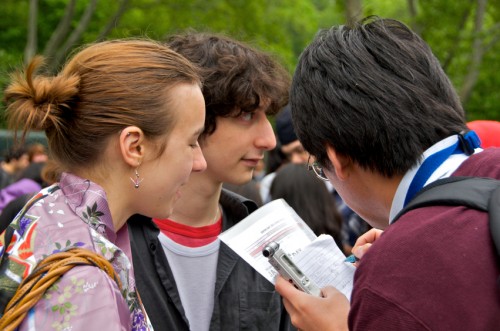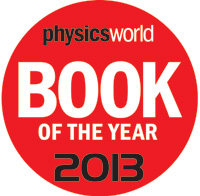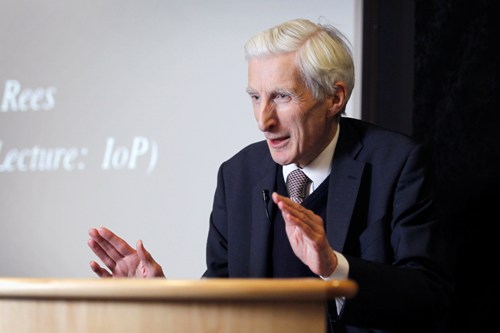Tag archives: awards
So, do you fancy winning $3m?

Money talks – $3m is up for grabs in the Fundamental Physics Prize Foundation’s Breakthrough Prize. (Courtesy: iStockphoto/solvod)
By Matin Durrani
An e-mail arrived in my inbox this morning from Rob Meyer, who names himself “administrator” of the Fundamental Physics Prize Foundation, seeking nominations for the Breakthrough Prize, which is worth a tasty $3m, and for the $100,000 New Horizons Prize, which is aimed at “young researchers”.
In case you’ve forgotten, the foundation was funded by the Russian investor Yuri Milner, who did a degree in physics at Moscow State University before making squillions investing in start-up companies such as Facebook and Twitter.
View all posts by this author | View this author's profile
New prize targets student science journalism

Courtesy: iStock/Jay Lazarin.
By James Dacey
There are many routes into science journalism, and my own journey was certainly not carved into a stone tablet when I was a child. In short, I was always fascinated by the ideas and concepts of science but my real passion was the communication of those ideas to others. (I was also fairly useless at the practical aspects of my BSc in natural sciences.) It was only later on, during my Master’s degree when I started writing for the student newspaper, that I started to seriously think about making a career out of this journalism game. I vividly remember the excitement of seeing my name in print those first few times. The idea that someone might actually pay me to include my name in their publication was too much to resist.
I knew of course that I was not alone in this career choice. The crucial next step for any budding journo is to build a strong portfolio of work and achievements to mark you out from the crowd. This helps you to grab the attention of those potential employers, who will quite likely be hurling you straight onto the front line of their operation as a junior reporter.
View all posts by this author | View this author's profile
100 leading British scientists
By Margaret Harris
Earlier this week, the UK’s Science Council – an umbrella group for learned societies and professional bodies – published a list of the country’s 100 leading practising scientists. The rationale behind the list is interesting: according to the Council’s press release, it’s meant to “highlight a collective blind spot” in our attitudes towards scientists, which tend to “reference dead people or to regard only academics and researchers as scientists”.
I gave a quiet cheer when I read this. As I’ve noted before, fully 96% of the UK’s science PhD graduates make their careers in something other than academic research, yet their contributions often go unrecognized. There are many reasons for this, including commercial confidentiality and poor visibility (almost every academic scientist has their own webpage; most industry scientists don’t) along with the aforementioned “blind spot”. But whatever the reasons, a list honouring non-academic scientists seems long overdue.
Unfortunately, I’m not sure the Science Council’s list fits that description.
View all posts by this author | View this author's profile
Season’s greetings

A star glowing in the night. (Courtesy: ESA/Hubble)
By Hamish Johnston
Things are winding down for the holidays at Physics World and this afternoon the team will be enjoying our Christmas lunch at a local brewpub. Hopefully they will have a festive ale or two on tap! To brighten up this festive blog, we have chosen this stunning image of the variable star RS Puppis as our Christmas picture. It was taken by the Hubble Space Telescope and shows starlight reverberating through the foggy environment around the star.
View all posts by this author | View this author's profile
Book of the Year shortlist for 2013
By Margaret Harris

As the year draws to a close, it’s time for Physics World to dig into its cabinet full of popular-physics volumes, pore over the reviews and decide which of the 59 books we covered in 2013 deserves to be our pick for the year’s best.
As we did last year, we’ve begun by selecting a shortlist of the 10 books that most closely meet our award criteria, which are that the winning book must be novel, scientifically interesting and (of course) well written. This required us to make some tough choices: although many books fulfilled two of our requirements, fewer could claim high marks in all three areas.
The books on the 2013 shortlist are an eclectic group, reflecting the “big tent” nature of physics in recent times. They include popular-science works on biophysics, bombs and a seriously important boson, plus vivid biographies of two very different figures from the history of physics. And we are fairly certain that ours is the only “best books” list you’ll ever see that pits a scholarly argument about the nature of time up against a fan-friendly look at mathematics in the animated TV show The Simpsons.
View all posts by this author | View this author's profile
Who will bag the 2013 Nobel prize?
By Michael Banks
Yep, it’s that time of year again, when predictions for the Nobel prize get bandied about and notable physicists will be making sure that their mobile phones are fully charged in anticipation of a call from Stockholm.
The 2013 Nobel Prize for Physics will be announced on Tuesday 8 October at 11:45 CET. Work on the Higgs boson, which was discovered last year at CERN’s Large Hadron Collider, is the surely the hot favourite to win this year, but the Nobel Foundation sometimes springs surprises and 2013 may be no different.
So who do you think will win this year’s prize?
View all posts by this author | View this author's profile
From Mars to the multiverse
By Matin Durrani

Martin Rees, winner of the 2012 Isaac Newton medal, speaking at the Institute of Physics. (Courtesy: Helen Yates Photography)
I travelled to London last night to hear the celebrated astronomer Martin Rees give an entertaining and thought-provoking lecture to more than 100 people at the Institute of Physics as the winner of the 2012 Isaac Newton medal – the Institute’s top award.
Having written more than 500 papers on everything from black holes and gamma-ray bursts to quasars and the dynamics of gas clouds, Rees’s bulging CV also includes spells as president of both the Royal Society and of the Royal Astronomical Society, which I guess makes him a worthy winner of the prize. (I should add that although the Institute publishes Physics World, I was not involved in selecting Rees for the award.)
View all posts by this author | View this author's profile
Talking about gravitation

By Tushna Commissariat
As I was looking through all that is new and exciting in the world of physics this morning, I came across this interesting paper titled “Persistence of black holes through a cosmological bounce”, recently published on the arXiv preprint server. The paper looks at the possibility of certain black holes persisting when the universe collapses in a “big crunch”, only to stick around for the universe to re-expand with a “big bounce”. The paper was written specifically for the 2011 Awards for Essays on Gravitation held by the Gravity Research Foundation. Upon investigation, I found another two submissions published on arXiv, entitled “Birkhoff’s theorem in higher derivative theories of gravity” and “Quantum gravity and the correspondence principle”.
The Gravity Research Foundation was founded by Roger W Babson, a graduate from the Massachusetts Institute of Technology, who had an interesting relationship with gravity. In his youth, his older sister drowned in a river near their home, prompting him to write an essay titled “Gravity – our enemy no. 1” wherein he claimed that it was gravity that killed her. “She was unable to fight gravity, which came up and seized her like a dragon and brought her to the bottom” he wrote.
Later he owed a debt of sorts to the theory of gravity as it helped him to predict the 1929 stock market crash based on the principle that if there was a strong upward action, there would follow a severe downward reaction. “What goes up will come down” he said. “The stock market will fall by its own weight.”
Gravity was a neglected area of physics in the 1940s. To energize the field, at the encouragement of his colleague George Rideout, he set up the Gravity Research Foundation, which handed out the first awards for the best essays submitted on gravity in December 1949. Previous prizewinners include Stephen Hawking (who has won it six times) and British science writer and astronomer John Gribbin (who was co-author of the winning paper, with Paul Feldman, when Gribbin was only 24) An archive of all winning essays can be found on the foundation’s website.
This year will be the 62nd year of the Essay Award and they will be announcing the top five prizewinners on 15 May, so all the best to the participants. And do look out for a follow-up blog!
View all posts by this author | View this author's profile